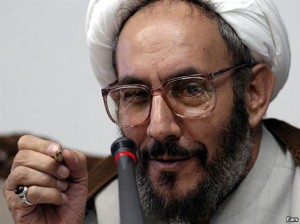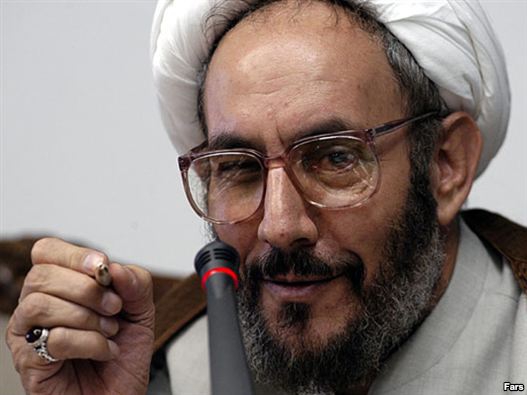 In a rare move likely to put the spotlight on the Iranian justice system, former Iranian intelligence minister Ali Younesi launched a series of criticisms against the countryís judiciary for its lack of independence.
In a rare move likely to put the spotlight on the Iranian justice system, former Iranian intelligence minister Ali Younesi launched a series of criticisms against the countryís judiciary for its lack of independence.In an interview with†Jamaran, a site close to the family of the late Imam Khomeini, Ali Younesi said judges were being intimidated by their superiors and the intelligence apparatus on a regular basis.
ďAt times, when a judge from Tehran is not willing to take orders from above, they bring a judge from Yazd [Province]ófrom one of its small citiesóor from Ardabil. Or [at times] theyíll just bring a judge with a troubled past who has no choice but to act according to the wishes [of superiors and intelligence officers].Ē
Younesi was appointed as intelligence minister under the presidency of Mohammad Khatami. Following the popular outcry over the intelligence ministryís involvement in the ďchain murdersĒ of a number of intellectuals and dissidents in the 90s, Younesi replaced Khatamiís first minister of intelligence, Dorri-Najafabadi.
ďWhen I was in this [judicial] system,Ē Younesi told†Jamaran, ďI defended the independence of the judges and did not allow myself to order judges around. If I saw a judge who was unprofessional and took orders from the police Ö I acted according to the law. More than anything, I saw myself as responsible for preserving the security, dignity and independence of a judge.Ē
The former intelligence chief continued, ďtoday the biggest risk to the judiciary system, [even] before moral and financial corruption, is its lack of independence. More than anything, we must foster this characteristic in [our] judges. We must institutionalise the notion of independence in the judiciary.Ē
The justice system has been headed by cleric Sadegh Larijani for the past three years. He took over from Mahmoud Hashemi Shahroudi during the aftermath of the rigged 2009 presidential election, which saw the re-election of Mahmoud Ahmadinejad.
Younesi, who headed the Judiciary Organisation of the Armed Forces during the early years of the revolution, also criticised the conduct of Iranís security apparatus in that period. He acknowledged that the practices of Iranian security forces in the 1980s led to widespread infringements of privacy and abuses.
ďWhen people entered cities, they would be interrogated extensively. For instance, you had to prove that the woman next to you was either your daughter or your wife. People had to present documents proving that the accompanying female was related [mahram] to them. In the beginning, the pretext for these checks were concerns about security and terrorist attacks.Ē
ďMany of the destructive conducts in the 80s,Ē Younesi continued, ďwere rooted primarily in revolutionary motives.Ē
ďUnfortunately, these misconceptions as well as religious misinterpretations turned into an issue of public concern Ö No one had the power to oppose them.Ē
This became so serious that it even prompted Ayatollah Khomeini to step in, Younesi claims. He said the Leaderís ďEight Articled DirectiveĒ concerning the rights of the people had the effect of restoring some hope amongst the general public.
The sixth article of the directive†states†that,
No one has the right to enter anyoneís house or shop or workplace without the permission of their owners or arrest any person or in the name of discovery of crime or committing of sin. No one has the right to pursue and follow somebody or insult an individual and commit inhuman and un-Islamic acts or eavesdrop over the telephone, or make a recording on a cassette recorder on the pretext of locating a centre of vice or in order to prove a crime and sin Ö No one has the right to place listening devices or unearth the secrets of the people or work undercover to discover the sins of others or to disclose the secrets of others Ö All of these are crimes and are sins and some of them Ö† are among the cardinal sins.
Issued in December 1982, the directive was addressed to former Chief Justice Abdolkarim Mousavi Ardabili and former Prime Minister Mir Hossein Mousavi. Mir Hossein Mousavi, a candidate in the 2009 presidential election, spearheaded the opposition Green Movement until February 2011 when he and fellow opposition figure Mehdi Karroubi were placed under illegal house arrest. Human rights groups say their ongoing detention violates international law as well as Iranís own constitution
Younesi has been a prominent critic of the Ahmadinejad administration.
In late 2008, he said that ďcertain criminalsĒ had infiltrated some of the countryís ďkey positionsĒ and argued that ?Ahmadinejadís tirades about Israel and the Holocaust had been ďextremely beneficial to Israel.Ē Following the remarks, Ahmadinejad supporters accused the former intelligence chief of being an Israeli agent.
In a recent interview with the†Maghreb†newspaper, Younesi called Ahmadinejadís tactics during the 2009 presidential campaign ďunethical.Ē
ďAnd now, heís the paying the price,Ē he said.
Younesiís son Hasan, a lawyer, was†arrested†during opposition protests in early 2011 and later†sentenced†to a year in prison. He also†received†a five-year ban on practicing law.
By Eurasia Review
The Iran Project is not responsible for the content of quoted articles.











